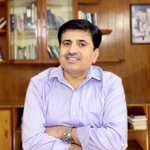آٹزم سپیکٹرم ڈس آرڈر کیا، کیوں، کیسے ۔ دوا علاج کے معاملات – حسین قیصرانی
Autism Spectrum Disorder (ASD): An Overview
Autism is a term commonly used to describe a spectrum of developmental disorders, formally known as Pervasive Developmental Disorders (PDD). The condition is characterized by significant differences in cognitive, language, social, and motor development, typically becoming apparent before the age of three. Research suggests that Autism Spectrum Disorder (ASD) may stem from challenges in regulating expressive movement and sensory responses, making it difficult for individuals to manage body movements and react consistently to the environment and others. These difficulties can profoundly impact social interactions, communication, and adaptive functioning.
ASD occurs in approximately 15 out of every 10,000 births, with males being four times more likely to be diagnosed than females.
Causes of Autism Spectrum Disorder
While the precise causes of ASD are not fully understood, scientific evidence suggests that both genetic and environmental factors contribute to its development. In the past, autism was mistakenly believed to be the result of psychological stressors or poor parenting. However, modern research points to irregularities in brain development and dysfunctions within the central nervous system as the root causes of autism. These developmental disruptions may be influenced by a range of factors, including genetic predispositions, chemical exposures, and viral infections.
Signs and Symptoms of Autism Spectrum Disorder
ASD encompasses a wide range of behaviors and abilities, with each individual demonstrating unique characteristics. No two people with autism will exhibit the same symptoms, and the severity of these symptoms can vary greatly. Below are some common behavioral and developmental challenges seen in individuals with ASD:
Social Skills
Individuals with ASD often struggle with social interactions. Some may avoid eye contact, prefer to be alone, or have difficulty understanding or expressing emotions. Children, in particular, may resist physical affection or only engage in cuddling when they choose to do so. Others may not recognize when someone is trying to engage with them, while some may want to interact but lack the skills to do so appropriately.
Speech, Language, and Communication
Around 40% of children with ASD do not speak at all, while others may exhibit echolalia—repeating words or phrases that they have heard, either immediately or at a later time. For example, if asked, “Do you want some juice?” a child with ASD might simply repeat, “Do you want some juice?” rather than answering the question. Other speech-related challenges include difficulty understanding gestures (e.g., waving goodbye), using incorrect pronouns (e.g., saying “I” when they mean “you”), or having a monotonous tone of voice that seems disconnected from the context. Some children may talk excessively about topics of particular interest but struggle with reciprocal conversation.
Repetitive Behaviors and Routines
Individuals with ASD often engage in repetitive actions and may seek rigid routines. For example, a child might insist on performing tasks in a specific order (e.g., washing their face before getting dressed). Any deviation from these routines can lead to frustration or distress. Many children with autism may excel in areas such as solving puzzles or using computers, yet find everyday social and communication tasks more challenging.
Diagnosis of Autism Spectrum Disorder
ASD is diagnosed clinically, based on the presence and severity of its core traits. This typically involves a comprehensive evaluation by healthcare professionals, including developmental and behavioral assessments. Early diagnosis is critical to initiating appropriate interventions that can significantly improve the child’s development and quality of life.
Treatment Options for Autism Spectrum Disorder
The treatment approach for ASD varies depending on the severity of the disorder and the individual’s specific needs. Common treatment methods include:
- Behavioral Therapy: Focuses on improving specific skills and behaviors through structured interventions.
- Speech Therapy: Helps individuals with communication difficulties.
- Occupational Therapy: Addresses sensory processing issues and motor skills development.
- Medications: May be prescribed to manage symptoms such as irritability, anxiety, or hyperactivity.
For children with milder forms of autism, early intervention with these therapies can often lead to significant improvements in social skills and functioning.
Homeopathic Treatment for Autism Spectrum Disorder
Homeopathy offers an alternative treatment approach by addressing the individual as a whole, rather than focusing solely on the symptoms of autism. Homeopathic practitioners consider not only the symptoms of ASD but also the person’s overall physical and mental constitution, medical history, family background, and even details related to pregnancy and vaccination history. Based on this comprehensive analysis, a personalized homeopathic remedy is chosen to support the child’s overall well-being.
Some homeopathic remedies that have been used in the treatment of ASD include:
- Bufo
- Borax
- Baryta Carbonica
- Calcarea Carbonica
- Calcarea Phosphorica
- Carcinosin
- Cuprum Metallicum
- Helium
- Hydrogen
- Lycopodium
- Medorrhinum
- Silicea
- Secretin
- Stramonium
- Thuja
These remedies aim to address the underlying causes of autism and improve behavioral outcomes. For instance, Carcinosin may be helpful for children who display obsessive or compulsive tendencies, while Cuprum Metallicum is often used to address irritability, aggression, and repetitive behaviors.
Common Homeopathic Remedies for ASD:
- Agaricus: For children who are socially withdrawn, have jerky movements, or exhibit fearfulness, singing, or muttering.
- Androctonus: For children who display mood swings, destructiveness, and quick temper, often switching between feeling angelic and devilish.
- Helleborus: For children who are slow to respond, appear thoughtless or disconnected, and exhibit general muscular weakness.
- Saccharum Officinale: For children who struggle with emotional connection, this remedy can help restore emotional engagement with family and peers.
- Thuja: Often used when autism seems linked to a history of vaccinations, with symptoms including fixed ideas or a sense of disconnection between mind and body.
The Role of a Professional Homeopath
It is essential to consult with a trained homeopathic professional for a thorough evaluation. Homeopathy is highly individualized, and a remedy that works for one child may not be suitable for another. A professional homeopath will assess the full range of symptoms and select the appropriate remedy in the correct potency to provide the best results for each individual.
Conclusion
Autism Spectrum Disorder is a complex condition that affects individuals differently, with varying degrees of severity. While there is no cure for ASD, early diagnosis and appropriate intervention can significantly improve the quality of life for those affected. Whether through conventional therapies or alternative treatments such as homeopathy, there are many avenues for support. It is crucial to take an individualized approach and work closely with healthcare professionals to determine the best treatment plan for each child.
Courtesy:

